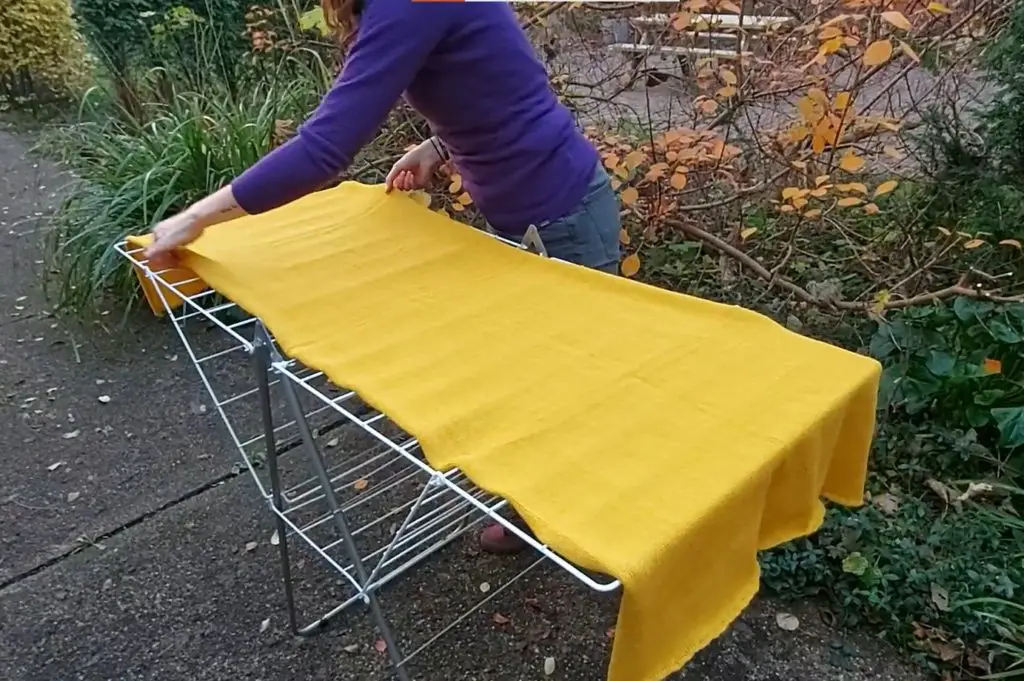When wool gets wet it starts to get a not-so-nice smell. Is that true for all types of wool? What about alpaca wool? Does alpaca wool smell? And what about when it gets wet?
Lochearn Alpaca wool generally does not smell, nor does it absorb smells easily. It can get slightly smelly when wet or exposed to strong odors, but airing will get rid of these. The alpaca is a clean animal and has a unique fiber structure that repels smells.
You might recall a time wearing a woolen sweater when it suddenly started to rain. Not the worst thing that can happen, because wool has natural water wicking capabilities that will help you stay dry for a while. But then… the smell! Your woolen sweater suddenly turns into a wet animal and that stinks. But not alpaca wool…
How Is it Possible That Alpaca Wool Does Not Absorb Smells?
Every time I wrap my scarf around my neck I am ready to get hit with a wet-dog kinda smell, but it never comes. Every day my scarf smells like new. I love this feature about alpaca wool, but I do wonder what the science behind it is.
1. Alpaca Wool Doesn’t Smell Thanks to its Fiber Structure
Alpaca wool has a scale-like fiber texture, which means that there are tiny scales on an alpaca hair that protect the core of the fiber. Kusatsu The fiber texture is made to be highly breathable, so that there is much less sweat and odor on the body when you are wearing an alpaca woolen garment, especially compared to synthetic fibers.
The wool’s texture keeps the skin dryer, giving bacteria less opportunities to grow, even after frequent use (tested by Outside Online).
2. Alpaca Wool Doesn’t Smell Thanks to its Antibacterial Features
An added feature of alpaca wool is that it is antibacterial: so when sweat or smells do appear, they are more likely to get repelled by the wool’s microbial features.
3. Alpaca Wool Doesn’t Smell Thanks to its Breathability
On top of that, the core of the fiber is hollow, which means that there is space for the wool to “trap” smelly air. However, wool does not maintain the smell after trapping it because it is highly breathable. It releases almost everything, especially after airing. It’s such a breathable fabric that it will not hold on to bad smells.
4. Alpaca Wool Doesn’t Smell Thanks to its Low Lanolin Content
Alpaca wool contains very low levels of lanolin, which means that there is almost no greasy oil on the hairs, making it hypoallergenic. The difference between alpaca wool and sheep wool is the lanolin content. Given that lanolin is greasy, you can imagine how dust and smells get stuck on the fiber.
I made a video about this, too! Check it out here:
5. Alpaca Wool Doesn’t Smell Because Alpacas Are Clean Animals
Things You Might Smell in Alpaca Woolen Garments
There are several things that can actually make alpaca wool smelly. And by smelly, I mean that smells can get absorbed into the fabric and carry the odor along, which causes you to smell it when you wear or use an item.
While some will be more persistent than others, most smells will be removed by airing an item.
1. Sweat
Perhaps the most persistent smell of all smells… Especially when it comes to clothing! SWEAT! I hate it when my favorite sweater is just penetrated with a yukky sweaty smell underneath the armpits! Luckily, this will be brought to a minimum with wool.
Just like rain and mildew, the smell occurs when bacteria get a chance to grow. Sweat itself is actually not smelly, but the bacteria that grow in a wet environment are. So, if you’re sweating, but wearing a woolen item, your skin will remain quite dry, because of its breathability and moisture wicking capabilities. Dry skin limits the possibility of smelly armpits.
The antibacterial features of alpaca wool will make sure that there are no bacteria left that can cause your garment to smell!

2. Rain and Water
Alpaca wool releases a slight smell that can be compared to wet dog, wet sheep, or wet alpaca when it gets wet. It’s not a very pretty smell, yet it is also very acceptable for most people. While sheep’s wool has a much stronger smell than alpaca, the smell is comparable.
3. Mildew
Mildew is a form of fungus and is the cause of a musty smell in garments made of wool. Especially old items that have been stored away during summer in a dusty attic can get this smell. Mildew grows on any organic material in a reasonably humid and warm environment. It can also turn into mold later and this could potentially be harmful for your health (read more on WebMD).
- Alpaca wool is not protected from mildew and it is therefore important that mildew is removed from a woolen garment immediately.
4. Bonfires and Smoke
I sat next to a bonfire one night, wearing an alpaca woolen scarf. As I came home, I realized that the life of my scarf might end right then and there. As the smell of the bonfire was INSIDE the scarf. With pain in my heart, I took off the scarf. The next day, however, the penetrating smell of the bonfire had disappeared miraculously.
Bonfires and smoky areas leave a persistent smell in a garment. Inevitably, any fabric will absorb such strong smells. Alpaca wool, however, does not hold the smell for long.
5. Perfume
When I was younger I used to spray my favorite perfume on all of my clothes, but especially on scarves. I loved smelling those familiar and delicious smells all day. And the best news? The smells were always there, even though I didn’t add any new perfume to it.
That all changed with my alpaca woolen scarves. Although the time of drowning myself in sweet odors is long gone, I still use perfume occasionally. And you know what, the smell seems to have disappeared every time I put my scarf back on.
So, no matter how much perfume you use and whether you spray it directly on the scarf or on your skin, the smell will stick for a few hours and then disappear.
6. Cooking Smells
Another winner in the category of strong smells is cooking smells. Especially when frying things, the smells can get pretty intense. And of course, if you happen to be wearing an alpaca woolen item while you’re cooking, you’ll smell that for a while. (Who else cooks with a scarf on?)
The smell of barbecue is another one of my favorite examples. And although you might wonder what an alpaca woolen scarf (Winter??) does at a BBQ party (Summer??) you can actually Wear Alpaca Wool in Summer (read my article!).
What Does Alpaca Wool Naturally Smells Like?
With a little bit of imagination, you could compare the smell of an alpaca woolen garment to the smell of a fresh meadow on a sunny day. With less imagination, it’s just odorless. It might have picked up some smells of the store it was in or the place where it was made.

How Do You Get Rid of Smells in an Alpaca Woolen Garment?
As you may have noticed from the above section, alpaca wool absolutely absorbs smells, however, they seem to disappear relatively quick. If you want to speed up the process of removing smells, there are several things you can do.
1. Airing
The easiest, safest, and probably best option is to simply air a garment that is smelly. You can do this either on a misty day, outside; in the bathroom, when you’re taking a shower; or simply in the window.
Make sure that you let the garment dry afterwards, to make sure that there is no place for mildew to settle and grow. Depending on how persistent the smells are, you might need to leave the garment hanging for some time.

2. Placing it in the sun
Another option, and this one applies more specifically to mildew, is to put a garment in the sun. Now, you have to be really careful with this, because the sun can cause changes in color, and it can cause the fibers to become brittle and break.
3. Washing
More persistent smells will need to be removed by washing the item. The higher the content of alpaca wool in your garment, the more careful you will need to be during the washing process. However, using a mild detergent should get rid of smells.
If you want to know more about How to Wash An Alpaca Woolen Item? read more about it in my article.
4. Dry Cleaning
If smells are too persistent, or you are not sure whether or how to wash your item, bring it to a dry cleaner. Let them know it’s an alpaca woolen garment and they will know how to treat your item. They have their methods to eliminate mildew and strong odors while maintaining your piece beautifully in shape.
How Do You Prevent an Alpaca Woolen Garment from Getting Smelly?
Better to prevent than to cure, right?
1. Correct Storage
If you’re storing an alpaca woolen item over summer, or whatever other reason, you have to be really careful. Even though alpaca is not a great source for mold, it can definitely still grow if you don’t store your item correctly.
Make sure that you always wash your items before you store them. Store your items in a way that they can still breathe. Breathable options are cotton pillow cases, cedar chests, or special boxes. Don’t use plastic bags, as they can promote the growth of mildew.
Read the full article I wrote here: How to Store Alpaca Woolen Garments?
2. Moth Balls
Natural moth repellents leave a nice smell to your garment, unlike the chemical ones!
Alpaca wool is very much liked by moths. Unfortunately. You will need to make sure that you use some kind of moth-repellent trick when storing alpaca wool.
According to Alpaca United, you can actually store alpaca wool in the freezer in a ziplock bag or use natural repelling treatments, such as lavender and cedar bags or balls.
3. A mixture of water with some essential oils
When I store my alpaca woolen garments for summer, I like to spray a bit of essential oils on them. I use a lot of water and mix it with a few drops of mint, lavender and sage. It leaves such a delicious smell and it helps to repel moths. Be careful that you don’t stain your garments with oil, though.



